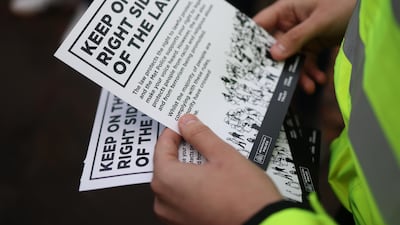The British government’s new definition of extremism has been met with warnings from MPs that it will negatively affect free speech.
There are also concerns that people or groups labelled extremist under the guidelines will not have a clear right to appeal.
Some academics have welcomed the new description as “great improvement”, however, with extremism now clearly defined as “an attempt to destroy fundamental rights and freedoms”.
Freedom and rights
The move has been driven by Communities Secretary Michael Gove after concerns over the tensions and language witnessed in pro-Palestinian marches since the Israel-Gaza war started.
Groups or individuals deemed extremist will now have any government funding and support withdrawn.
Mr Gove named a number of far-right and Islamist extremist groups that might be considered too radical under the new definition.
But in his statement to the UK Parliament he was keen to emphasise the definition was not “seeking to ban or restrict the operation of these organisations in a free society”.
Instead the government wanted to make clear it was wrong “to use taxpayers’ money or public endorsement to engage with these organisations”.
“It's important to stress that we in no way intend to restrict freedom of expression, religion or belief,” he said.
Protest outside UK Parliament calls for Gaza ceasefire - in pictures
Contrarian views
His statement did not receive outright approval across Conservative and opposition benches. Mr Gove struggled to respond to a question on how an organisation might appeal against its exclusions beyond suggesting a “judicial appeal”.
Former Conservative minister Robert Jenrick questioned whether there was enough protection for people who “simply hold contrarian views, who might find this definition used against them”.
Mr Gove responded that the new classification was much more likely to be misused than the previous one, which he said was “looser and baggy and capable of many more interpretations”.
The government now considers extremism to be “the promotion or advancement of an ideology based on violence, hatred or intolerance” that aims to “negate or destroy the fundamental rights and freedoms of others” or the UK’s democracy.
Great improvement
Dr Daniel Allington, an extremism expert from Kings College London, told The National that following the post-October 7 protests, which had “got out of hand”, the clarification “may help to restore confidence that we are not succumbing to mob rule”.
He argued it was a “great improvement” on the previous definition that was “too vague” and “chauvinistic” and which stated extremism was “vocal or active opposition to fundamental British values”.
“The new definition very clearly says that extremism is the attempt to destroy fundamental rights and freedoms,” he said.
“People still have the right to express views that we find objectionable, that is part of liberal democracy and this does not change that.”
It was instead “very clearly focused” on targeting those who were “actively working to destroy other people's rights”.
There was potential for the UK to learn from the UAE’s Hedaya counter-extremism centre after it was announced Britain would set up a new centre of excellence.
This would help avoid the “huge failures in due diligence”, Dr Allington said, in which one part of government might label an organisation extremist while another may unwittingly employ the group’s advice.
Hundreds protest outside the UK parliament demanding a ceasefire - video
Named groups
In the coming weeks, the centre, staffed by academics and civil servants, will publish a list of names it deemed extremist.
Mr Gove hinted at which groups these might be by referring to them in the Commons under parliamentary privilege.
He named the British National Socialist Movement and Patriotic Alternative, which “promote neo-Nazi ideology” and “argue for forced repatriation” of non-whites.
The Muslim Association of Britain (Mab), the British affiliate of the Muslim Brotherhood, Mend (Muslim Engagement and Development) and Cage, a group which in 2015 was connected to Mohammed Emwazi, who appeared in ISIS beheading videos, were identified as they “give rise to concern for their Islamist [extremist] orientation and views”.
Mab and Cage have condemned the definition change, saying it was an assault on civil liberties that targeted Muslim groups.
Criminalising speech
While she agreed with the new definition, Angela Rayner, the shadow communities secretary, said the government needed to take “much stronger action to tackle the corrosive forms of hatred that devastate lives and corrode communities”.
Miriam Cates, a Conservative MP, warned that the ruling risked “criminalising the speech of people who have perfectly legitimate, harmless views”.
Mr Gove said the centre of excellence “will show our workings” behind the decisions to list an organisation as extremist.
The new definition also made clear that extremism was conduct that falls short of criminality but was deemed “unacceptable”.













